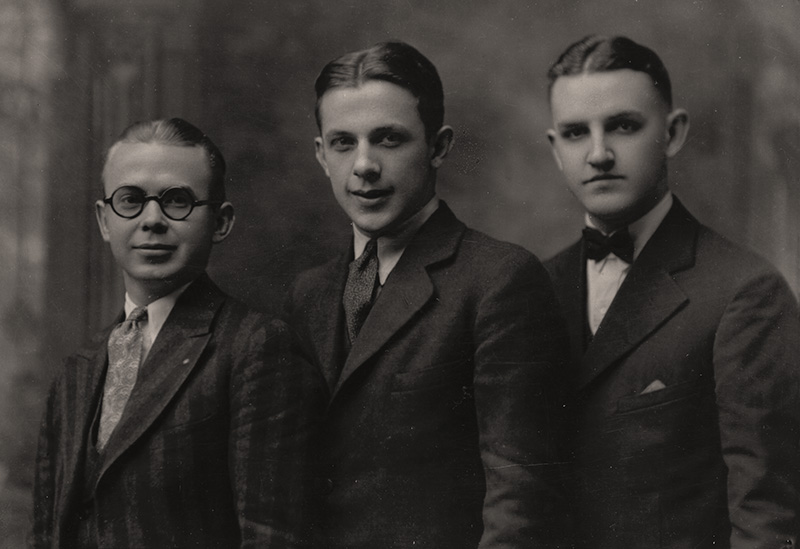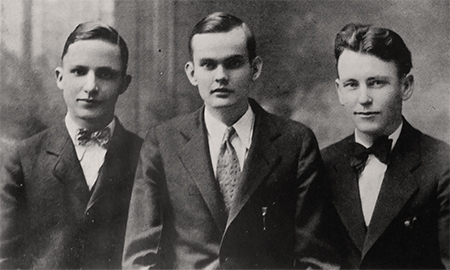< Back to Historical Archives main page
Summary of 1920 through 1929
The Congress Debating Club
On 24 November 1919, students of Western Kentucky State Normal School created the Congress Debating Club.1 Many students felt that the literary societies no longer supplied adequate public speaking opportunities. The previous decade of society speeches which preceded weekly chapel, and the moot congresses, effectively culminated at the end of 1919 with this student-lead group. Although not itself a competitive entity, the club was the primary sponsor of debate competition over much of its prodigious forty-six year history, sponsoring annual debates with the University of Kentucky little more than a year after its own inception. This merits its inclusion in these archives. Initially the largest and most prestigious club on campus, it also eventually became the oldest, and was--until February 1950--open only to men. Note that club officers were elected every five weeks.
Development of regular debate competition
Ogden College had competed in intercollegiate debates a few times in the previous decade, and continued in the 1920s, alongside some intramural contests. By 1921 Western Kentucky State Normal School, also, began annual intercollegiate debates. The Normal School expanded this a bit in 1925, so that by the next year school administration chose to support the program. Why such competitions should increase in popularity and regularity begs some explanation, though. Broadly, the 1919-20 school year had marked a dramatic increase in both school funds and the size of the Normal School student body, due to the local oil boom, the ending of the Great War, and the ending of the flu pandemic. Ogden College appears to have felt much the same upswell. These are believed by this author to be the primary reasons for the increased activity and regularization of debate and oratory competition. Note also that in the latter half of this decade, both schools increased their number of clubs, sports activities, and fraternities, and this dilution may have caused some of the decline in debate competition. The nature of debate competition up through this decade has been that of a single contest. This is why students are labeled as either affirmative debaters or negative debaters. A given team usually consisted of three debaters and, possibly, an alternate. Debaters were matched against representatives of another school in a single match, not a multi-school tournament as would be found by, at least, the 1950s. While some other schools joined in a short round of contests over a week or two with two other schools--called a Triangular Debate--Western does not appear to have joined such a league. Instead, even when students of the Normal School competed in multiple debates within a school year--the 1930s--each was a single contest with the host school.
Absence of oratory between 1911 and 1927
The apparent absence of intercollegiate competition in oratory at the Normal School between 1911 and 1927 begs explanation. Unfortunately, only one clear source has yet been discovered on this subject, and its capacity to explain the gap remains unclear. Between February and March 1920, the president of Eastern Kentucky State Normal School proposed to Western Kentucky State Normal School President Cherry that the two create a new oratorical and declamation association, but President Cherry declined.2 Cherry's explanation pleaded overwork and included a curious reference to having "entered a contest of this kind a few years ago and did not find it satisfactory." The only currently known contest to which Cherry may have been referring was the 1910 intercollegiate contest referred to as the Interstate Oratorical Contest. Nevertheless, while it may explain why Western did not host another oratorical contest, it does not explain why Western did not compete. The only other current explanation for that gap is that President Cherry is known to have generally disapproved on extra-curricular activities.
Interpretation of Literature
As the previous decadal page noted, competition in interpretive reading originated on The Hill alongside oratory and debate, but not inter-collegially, and not for long. Instead of competing, the focus was teaching elocution or interpretative reading. As an example, the summer term preceding the 1922-23 school year brought Clara Janouch to teach a course in precisely the latter combination.3 To clarify the meaning of 'interpretation' here, a 1927 book helps us understand by creating a model of performance types, whereby 'reading, interpretation, impersonation, and acting' are sorted in order of increasing emotion and physicality.4
Collegiate competition's relation to high school
Collegiate forensic competition did not, of course, exist in a vacuum. Competition at the high school level was much more active, due perhaps to the much larger number of students in that age range, enabling inter-school competition without necessitating such long trips. As noted in the previous decadal page, students of Western's training school and of Ogden's Preparatory class were part of this firmament: high school students. Kentucky began its high school state tournaments in May 1921, offering debate and essay writing, and later adding oratory, declamation, and then interpretive reading. These archives do not significantly explore high school competition, so its effect on collegiate competition remains murky.
School mergers and name changes
To provide clarity below, note that WKSNS became the Western Kentucky State Normal School and Teacher's College in 1922, and at times both entities created debate teams even before the formal name change. Also, the Teacher's College hosted a school for younger kids, called the Training School, and those students often competed in the high school circuits. Ogden College also hosted younger boys, called the Prep Class, as a sort of private high school, and they also competed in this circuit. By 1928, Ogden College for Men also merged with the Normal School. For simplicity, this page does not label the Ogden & Robinson oratorical contests as exclusive to Ogden students, although it was until 1928. Instead, a reference is made in the 1928 sub-section specifying the merger of the two schools and its significant impact on the competition that year.
Shift from Normal School to Teacher's College
WKSNS transitioned from a Normal School and provider of secondary education to a Teacher's College and provider of four-year degrees from roughly 1910 through 1930.5 To illustrate, secondary education schools in KY quadrupled from 54 to 228 between 1910 and 1922, such that by 1930 students seeking credit from WKSNS without a secondary education had virtually ended. This coincided with a broader increase in academic standards and growth. The 1926-27 school year in particular marked a dramatic increase in both funds and the student body, which is believed to be the cause of the regularization of competition in that period.
Annual Subsections: 1920 - 1929
1919-20
Normal School Congress Debating Club
founded 24 November 1919 Sponsor: Finley C. Grise Gallys W. Allen, Lewis F. Allen, James A. Barnes, Gus Orell Basham, W. A. Bell, W. Kirk Berryman (first president), Bishop, Fred Boone, Dewey Brown, James A. Brown, Harold S. Cherry, Homer H. Cherry, William M. Crabb, Herbert W. Crick, Daniel Preston Curry, Luard C. Curry, W. F. Davis, J. D. Dixon, Lawrence E. DeMunbrun, Thomas R. Erwin (else Irvin), G. E. Ferran, F. C. Hall, T. O. Hall, R. E. Hall, Hardwick, John Yerkes Harper, John Sterling Jackson, Kennedy, J. A. Lewis, Clifton Sigsbee Lowry (first sec), John D. Lloyd, C. H. McGrew, W. A. Meador, Joe Miller, F. J. Monarch, C. P. Morris, C. H. Neagle, Leon O. Parker, Hazely Ray, Will Brown Ray, H. R. Riley, Raymond D. Ridley, Harvey W. Riggs, E. S. Robinson, Hugh Rone, Guy V. Shenk, Claude O. Spillman, Clay G. Sledge, Ed Smith, Clarence H. Taylor, W. B. Tyson, Raymond Vincent, J. B. Watkins, E. B. Whalin, Ozo Beckham Wilson, H. H. Wilson
Note that names from 1920 through 1923 are transcribed from handwriting, thus inconsistent spelling and readability may produce errors. Additionally, all sources from the period offer inconsistent spellings.
Ogden College oratory
Ogden: Harold Cherry; Robinson: Paul Hollins
1920-21
Normal School and Ogden debating teams
The Normal School's Congress Debating Club sponsored a debate with the University of Kentucky on 20 April 1921, which Western's team of Basil Jones, Hubert H. Mills, and Raymond Vincent won.6 It was hosted in VanMeter Hall. This appears to have been the start of what would become a brief tradition. Ward Sumpter, Roma A. Demunbrun*, and Forum A. Rudd, of Ogden College traveled to Bethel College (Russellville) in mid-April 1921, and won a debate.7 The entire Ogden student body fitted into twelve vehicles to watch the debate.
Congress Debating Club
Gallys W. Allen, Carlisle B. Barnes, James A. Barnes, Gus Orell Basham, W. A. Bell, E. D. Bernet, Mr. Berry, W. Kirk Berryman, Noble H. Clardey, Herbert W. Crick, Daniel Preston Curry, Luard C. Curry, Cayce Deathrage, Lawrence E. DeMunbrun, Roma DeMunbrun, J. D. Dixon, Thomas R. Erwin (else Irvin), W. O. Evans, H. E. Farmer, Fred Fray, W. C. Green, R.C. Hale, T. O. Hall, John Yerkes Harper, R. D. Holder, George O. Hunter, Mr. Irwin, Lee Jones, W. B. Jones, Kerry (?), John Ernest Kirksey, J. A. Lewis, Clifton Sigsbee Lowry, Roy McGee, J. W. Martin, Trenton Meredith, Hubert Howard Mills, C. H. McGrew, N. A. Meadow, C. P. Morris, Newman, Leon O. Parker, Will Brown Ray, Curtis Renfro, Raymond D. Ridley, Harvey W. Riggs, Shelby Riggs, Lloyd Rudolph, Guy V. Shenk, Clay G. Sledge, Wallace Franklin Smith, Edgar B. Smith, David Carl Spickard, James Spickett, Claude O. Spillman, Baird Stokes, Mr. Sturgeon, Raymond Vincent, Edwin Ward, J. B. Watkins, E. B. Whalin, Mr. White, Ozo Beckham Wilson, Wilmur Winkler
Ogden College oratory
Ogden: Edgar Osborn; Robinson: Claude Kinslow
1921-22
Debate at Ogden, but not Normal
Ogden College's Senior Society challenged Southwestern Presbyterian University (then in Clarksville, TN) to a debate on April 21, to be hosted in Bowling Green, but shortly before the event SPU had to cancel.8 No evidence of a Normal School debate could be found between the 28 February and 30 May issues of the Park City Daily News, suggesting that none was held.
Congress Debating Club
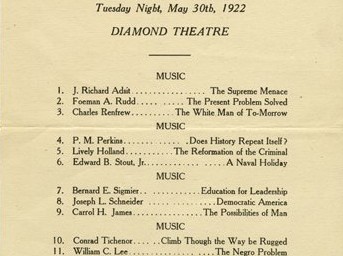 Gallys W. Allen, James A. Barnes, W.C. Barrow, Franklin Beasley, W.E. Berry, W.E.
(Aubrey?) Biasse, John Gaston Bishop, Paul Bolin, John Bondurand, Hayward Brown, E.D.
Brunette, H.S. Champion, Homer H. Cherry, Roy Chumbler, Noble B. Clardy, C.T. Clark,
R.W. Clark, Leline Crawford, Herbert W. Crick, Clarence B. Croft, William Dudley Croft,
Daniel Preston Curry, W.D. Dalton, Charles C. Dawson, Cayce Deathrage, Lawrence E.
DeMunbrun, James M. Ennis, Lane Ernest, Clifton G. Follis, Gary, Earl Hahn, Robert
E. Hale, T.O. Hall, Morris J. Hardwick, B.E. Harrison, J.W. Hinson, E.F. Howard, J.C.
Howard, Ewel(Evell?) Howton, J.W. James, Alva Jennings, Lee Jones, John Ernest Kirskey,
Roy McGee, Miles M. Meredith, Trenton Meredith, Mills, C.P. Morris, James R. Newman,
B.P. Osborne, Loice Owen, Leon O. Parker, Ivan F. Parrigin, (E.?) Scott Robinson,
Claude O. Spillman, Delphi(Delphus?) Starks, Buriel (Beard?) Stokes, Clarence H. Taylor,
Rhodie Thornberry, Louis K. Turner, Conrad Vincent, Matthew Vincent, Cephius Wade,
Virgil Wagner, Clarence Whalen, Leslie Wilson, Ozo Beckham Wilson, Jewell Wright
Gallys W. Allen, James A. Barnes, W.C. Barrow, Franklin Beasley, W.E. Berry, W.E.
(Aubrey?) Biasse, John Gaston Bishop, Paul Bolin, John Bondurand, Hayward Brown, E.D.
Brunette, H.S. Champion, Homer H. Cherry, Roy Chumbler, Noble B. Clardy, C.T. Clark,
R.W. Clark, Leline Crawford, Herbert W. Crick, Clarence B. Croft, William Dudley Croft,
Daniel Preston Curry, W.D. Dalton, Charles C. Dawson, Cayce Deathrage, Lawrence E.
DeMunbrun, James M. Ennis, Lane Ernest, Clifton G. Follis, Gary, Earl Hahn, Robert
E. Hale, T.O. Hall, Morris J. Hardwick, B.E. Harrison, J.W. Hinson, E.F. Howard, J.C.
Howard, Ewel(Evell?) Howton, J.W. James, Alva Jennings, Lee Jones, John Ernest Kirskey,
Roy McGee, Miles M. Meredith, Trenton Meredith, Mills, C.P. Morris, James R. Newman,
B.P. Osborne, Loice Owen, Leon O. Parker, Ivan F. Parrigin, (E.?) Scott Robinson,
Claude O. Spillman, Delphi(Delphus?) Starks, Buriel (Beard?) Stokes, Clarence H. Taylor,
Rhodie Thornberry, Louis K. Turner, Conrad Vincent, Matthew Vincent, Cephius Wade,
Virgil Wagner, Clarence Whalen, Leslie Wilson, Ozo Beckham Wilson, Jewell Wright
Ogden College oratory (copy of program to the right)
Ogden: William C. Lee; Robinson: James Chandler
1922-23
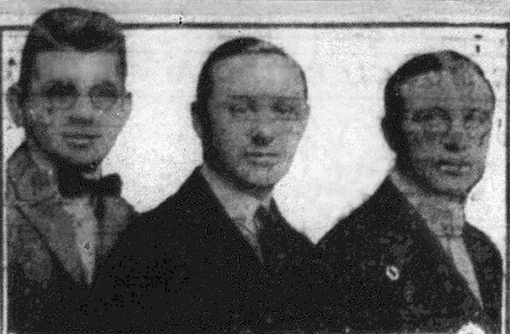
Debate at Ogden and the Normal School
Raymond Vincent, Meredith G. Carpenter, and H.C. Ogles, of the Normal School, debated the University of Kentucky in Lexington, on an unknown date presumed to be in April.9 The lack up a follow-up article suggests to this author a loss. The photo on the right was taken from news print. Ogden College's Claude Kinslow, Estell Mansfield, and James Chandler debated Morton-Elliott at BGBU on March 16. Results have not been found, though there is a mention of the debate having occurred, which may suggest that Ogden lost.10
Ogden College oratory
Ogden: Roscoe L. Murray; Robinson: Lawrence Duncan
Congress Debating Club
James A. Barnes, W. Kirk Berryman, W.B. Carr, R.W. Clark, William M. Crabb, Leline Crawford, Clarence B. Croft, Daniel Preston Curry, Luard C. Curry, Lawrence E. DeMunbrun, J.D. Dixon, James M. Ennis, T.O. Hall, Claude Hightower, Basil Jones, W.B. Kerr, S.C. McCauley, Elbert L. McCubbin, A.B. McKnight, Miles M. Meredith, D.D. Mosley, James R. Newman, B.P. Osborne, Loice Owen, William Burnice Owen, Ivan F. Parrigin, Riggs, Guy V. Shenk, Clay S. Sledge, G.E. Strickler, James F. Tanner, Raymond Vincent, W.A. Warren, Leslie Wilson, Ozo Beckham Wilson
1923-24
Debate at WKSNS Teachers College and Ogden
John S. Brown, James F. Tanner, and Barkus Gray, of the WKSNS Teachers College, debated Berea College on 24 April 1924 on campus, and won.11 In mid-April 1924 Lawrence Duncan, Truman Demumbrum, Maurice Burton, and Jimmy Chandler (alternate) of Ogden College traveled to Morton-Elliott and lost. Another debate, with Bethel College, was planned but shows no update in the school paper.12
Earlier, in early February, three Ogden students sponsored an exhibition debate between four black men from the Bowling Green area. Although the references to humor in debate found in the source are normal, the unusual specification that the Ogden's janitor presided suggests it may have been a mockery.13
Ogden College oratory
Ogden: Claude Kinslow; Robinson: Preston Smith
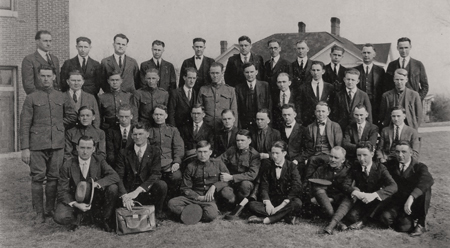
Congress Debating Club
CDC Motto: "Liberty and Oratory Inseparable" Finley C. Grise (sponsor), Bronston L. Curry (pres), C.M. Whallen (vp), H.A. Simmons (sec), George E. Ferren (sgt-at-arms) James A. Barnes, W.E. Berry, Whipple Black, Paul Bolin, Loyal Brann, John S. Brown, F.C. Button, J.B. Carr, Carl T. Clark, J.L. Crawford, C.C. Crow, B.L. Curry, Daniel Preston Curry, Luard C. Curry, D.S. Edwards Jr., James M. Ennis, E.S. Estes, J.F. Farmer, Grover E. Ferren, Presley M. Grise, Earl Hahn, T.O. Hall, O. Harkins, N.T. Hooks, Lewis Hume, M.S. Hutchens, Henry Iler, J.W. Jones, Lee Jones, William Kelly, W.B. Kerr, George W. King, John Ernest Kirksey, Elbert L. McCubbin, Don McMillin, H.R. Matthews, H.W. Meredith, Clarence P. Morris, Cecil Neisz, Benjamin Dinsmore Nisbet, James Parrish, Henry C. Price, Edward Ray, Edward Scott Robinson, H.S. Simons, R.E. Simons, Clay G. Sledge, G.E. Strickler, W.R. Tabb, James F. Tanner, Arlie L. Townsend, Rhoda Thornberry, H.A. Ward, C.M. Whallen, R.H. Willoby, S.S. Wilson
1924-25
WKSNS Debating Teams
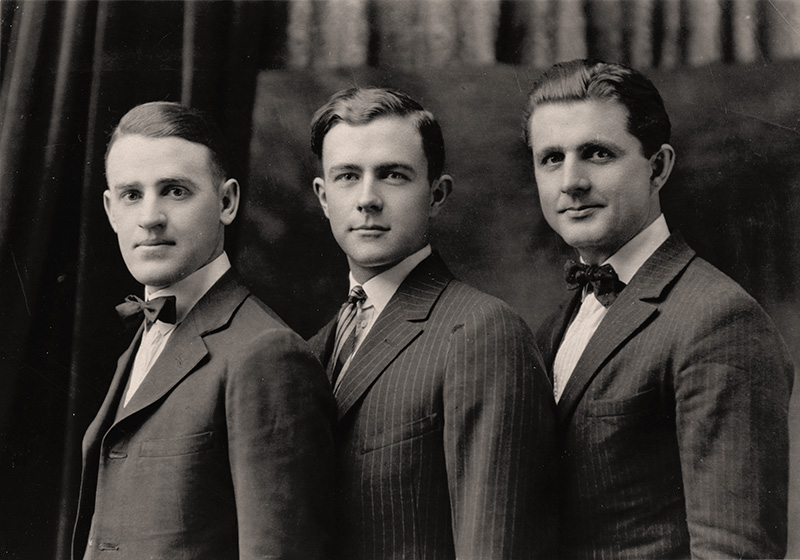
Western Kentucky State Normal School: Glenn Kendall, James F. Tanner and Carl Vincent debated Berea College on Western's campus on 13 April.14
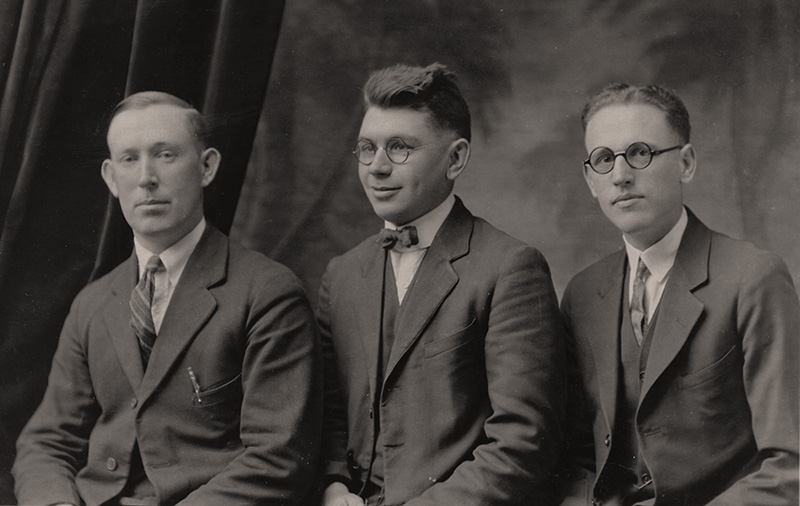
WKSNS Teacher's College team: Sam L. Gaskins, Raymond L. Vincent, and Presley M. Grise debated at Middle Tennessee Teachers College on 24 April.
Ogden College oratory and debate
Thomas W. Hines placed third in the Southern division, in Nashville, of a National Intercollegiate Oratorical Contest on 18 May.15 The winner of that contest represented the South (one of seven national regions) in a final tournament in California. In intramural debate, Guy Howerton, Walter Schade, and McCandlass of the College Literary Society won the Obenchain Cup.16
Ogden College oratory
Ogden: Alvis Temple; Robinson: Thomas Daughtry
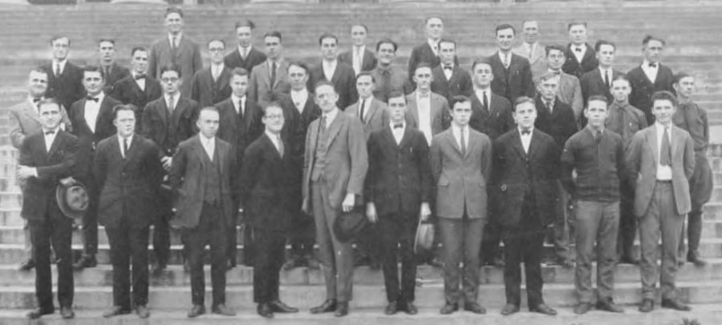
Congress Debating Club
Faculty Sponsor: Dr. Finley C. Grise Elbert L. McCubbin (pres), Johnnie Carr (vp), Virgil Payne (secr), M.L. Hutchens (sgt-at-arms) Whipple Black, Carlos Burkhead, Bronston L. Curry, Ralph W. Clark, James Ennis, Marvin Greer, Sam L. Gaskins, Robert Green, P. L. Grise, J.D. Hearin, B.E. Hadden, C.C. Hart, W.C. Hightower, Hubert Hume, O.P. Hurt, W.B. Kerr, H.N. Lackey, Monroe L. Majors, Miles W. Meredith, Cecil Neisz, Loice Owen, B.M. Owen, Henry Pilkenton, Henry C. Price, Dick Rankins, Herman J. Robertson, Scott Robertson, Edward Scott Robinson, Guy Shenk, Herbert Smith, H.R. Spear, John L. Story, George E. Strickler, Roy Tabb, James F. Tanner, Cecil A. Thompson, Rhoda Thornberry, Robert Turner, Carl Vincent, Paul Vincent, Raymond L. Vincent, Steve Wilson, E.B. Whalin, Robert G. Willis, Cecil C. Wright
1925-26
WKSNS Debating Teams
|
An article in the December 1925 Teachers College Heights explained that the debate program was expanded in 1926, which the below photos indicate.17 The men's teams were created after a twelve-contestant elimination contest. A "girls team" also debated Georgetown College, after sixteen women tried for the team. 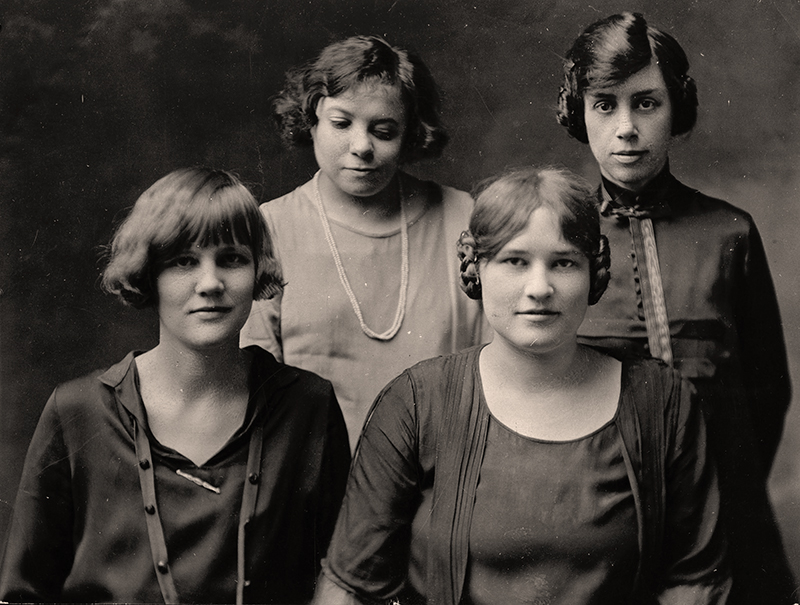 Debating Georgetown College: (back, l-to-r) Elizabeth Utterback, Anna Knapp Gill; (front, l-to-r) Lillian Mae Johnson (alternate), and Nina Elizabeth Lashbrook (alternate)18 |
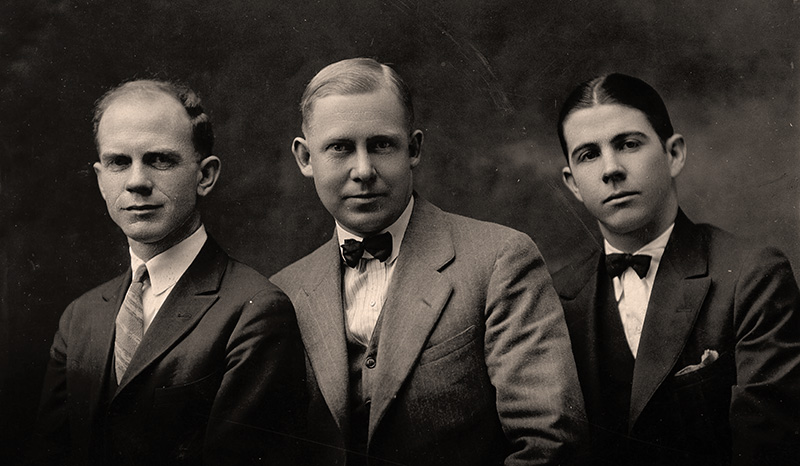 John R. Cooper, E.B. Whalin, and William Owen Toy; the negative team which represented Western Kentucky State Teacher's College against Berea and Middle Tennessee State Teachers College 1926 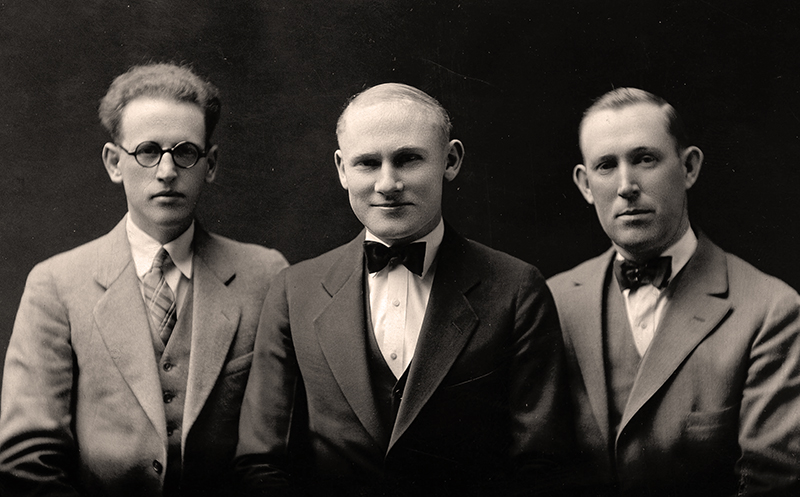 Affirmative team representing the Western Kentucky State Teacher's College against Berea and Middle Tennessee State Teachers College 1926: Presley M. Grise, James R. Newman, and Sam. L. Gaskins |
Ogden College oratory
A 1927 source notes that Ogden sent a student to compete in the regional qualifier for the National Intercollegiate Oratorical Contest again, but no source yet provides any more information.22
Ogden: Lawrence Duncan; Robinson: William David McElroy, Jr.
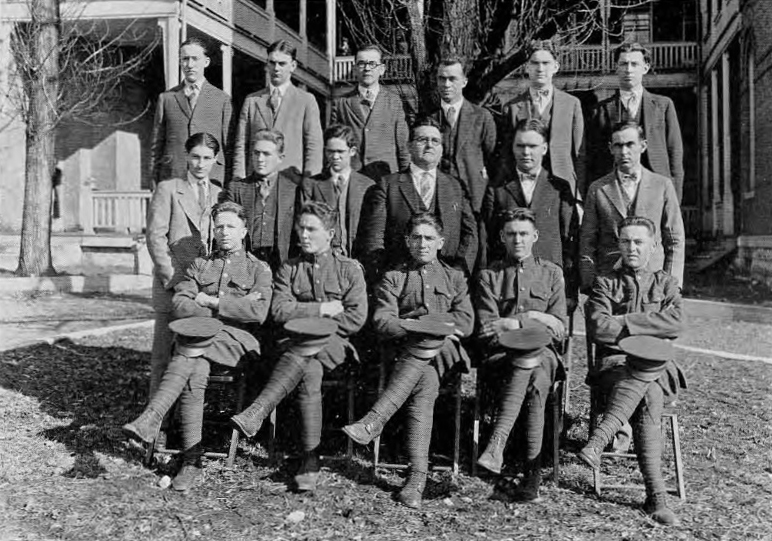
Normal Debating Club
A.M. Wilson, sponsor; Rex E. Hayes (pres), L.G. Curry (vp), Jasper Thomas (sec-trea), Jesse Holcomb (sgt), L.F. Blair, William Davis, Mayburn Edens, Frank J. Emberger, Hobert Hines, Evon Howell, Eldon Lewis, Robert L. Petrie, Charles H. Redmon, Cedric Simons, Randell E. Thomas, J. Melvin Walker
It's not clear yet what to make of the Normal Debating Club. This yearbook photo with names is the only yet known source for the group's existence. Considering the school's recent investment in competitive debate it is reasonable that a new club would form as well. That the Congress Debating Club already existed is the real conundrum. While the Normal School and the Teacher's College were technically two different schools, there is no indication that the CDC was exclusive to students of the Teacher's College. In fact, one person was in 1926 a member of both clubs, and was attending the Normal School. The author's guess is that a sudden rush of interested in competitive debate sprouted a new club among either Normal School students or faculty, which was quickly deemed redundant in light of the CDC.
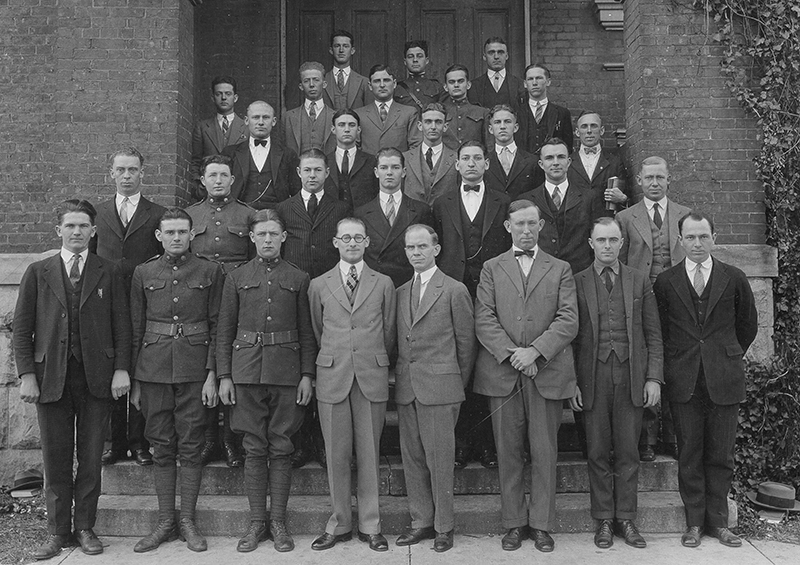
Congress Debating Club
Finley C. Grise (sponsor) John R. Cooper (pres), Harold McCombs (v-p), Sam L. Gaskins (sec) and C.C. Hart (sgt at arms) Ernest Arrington, Wendell Bunch, Ralph W. Clark, Bronston L. Curry, L.G. Curry, Fred Edwards, Norris Gardner, Presley M. Grise, Jesse Hart, Tremayne Hayden, Ernest Howton, Raymond Hornback, Arthur Lloyd, Elbert L. McCubbin, Don McMillin, James R. Newman, J.D. Newton, D.F. Nisbet, Roy H. Owsley, A.C. Park, Henry Price, Casey Purdy, Frank Richardson, Shelby Riggs, Herman Robertson, Ira Simmons, William R. Smith, H.K. Spear, Jack Thompson, E.B. Whalin, Harold Wheat, Percival Wilcox, Stephen Wilson, L.B. Woosley and Cecil Wright.
* Special thanks to the WKU Archives for producing the club photo to the right, an original print.
1926-27
WKSNS Debate
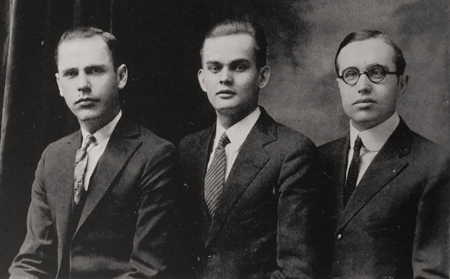 Affirmative against Berea: Strauther W. Grise, William R. Smith, and H.C. Ogles |
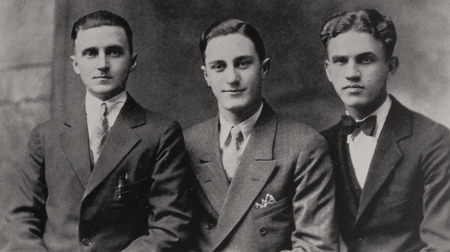 Negative against Berea on 13 April: Ray Hocker, Luther Keen, and Roy H. Owsley |
The above images represent the pair of debates against Berea on 13 April 1927. The affirmative team hosted, while the negative traveled to Berea. The affirmative team won.19 A "Freshman debating team" was formed to debate freshmen from the University of Louisville in May, but research for details continues.20 Western's team at this contest: Negative: Mr. Meltuen (?), Mr. Ivy L. Baker, Ms. Ada M. Rhoads; Affirmative: Roy Hawk, Ms. Francis Freda Feebach, and John M. Hennigen. Note the gender integration of the teams. That is not found again in these archives until 1951.
WKSNS Intercollegiate Oratory Jack Thompson represented Western at a district oratorical tournament on 7 May 1927 in Memphis,
sponsored by the Nashville Banner.21 He did not advance to the final round. The only previous evidence of competition
in oratory stretched back to 1910. Jack Thompson represented Western at a district oratorical tournament on 7 May 1927 in Memphis,
sponsored by the Nashville Banner.21 He did not advance to the final round. The only previous evidence of competition
in oratory stretched back to 1910.
|
Ogden competition?Frustratingly little is known of Ogden's competition this year. They apparently intended to compete in the National Intercollegiate Oratorical Contest again, but no follow-up is known. Additionally, Franklin P Hayes was selected to represent the school at the Courier Journal's state oratorical contest, but there is again no follow-up.22Ogden College oratoryOgden: John L. Rose; Robinson: Franklin Pierce Hayes |
Congress Debating Club
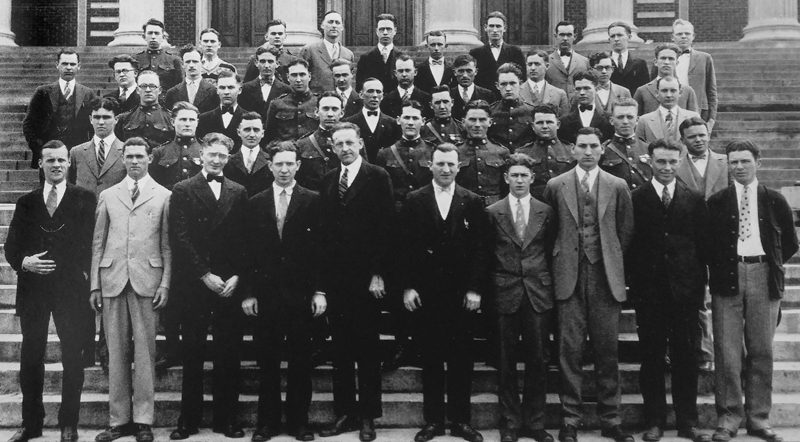 Dr. Finley C. Grise (sponsor), Claude Hightower (pres), W.R. Hammond (vp), D.F. Nisbet
(sec), Roy Martin (sgt-at-arms) Otis Adams, J.R. Adams, Gillys Allen, W.H. Allen,
Lawrence Alexander, Carlos Burkhead, Ivy L. Baker, Johnnie Carr, Robert Carden, Fred
Crume, Albert Gordon Crume, L.G. Curry, Ellis Durrett, Robert Green, S.W. Grise, James
Hall, Jessie L. Hart, C.C. Hart, Roy Hawk, William Eberley Hammack, Ray Hocker, J.L.
Hoover, Ralph Honaker, Raymond Hornback, Kenneth Jones, Frank Jones, Ernest Jones,
Aubry King, Leonard Lindsey, Elbert L. McCubbin, David McEuen, John Morris, Shelley
Norris, Roy H. Owsley, R.E. Petrie, Charles Harrison Redmon, Elford Rippetoe, Martin
Roberts, W. Rogers, H.C. Smith, William R. Smith, I.E. Simmons, George Stith, George
Sturgeon, W.M. Taylor, John R. Thomas, J.P. Truitt, Robert Turner
Dr. Finley C. Grise (sponsor), Claude Hightower (pres), W.R. Hammond (vp), D.F. Nisbet
(sec), Roy Martin (sgt-at-arms) Otis Adams, J.R. Adams, Gillys Allen, W.H. Allen,
Lawrence Alexander, Carlos Burkhead, Ivy L. Baker, Johnnie Carr, Robert Carden, Fred
Crume, Albert Gordon Crume, L.G. Curry, Ellis Durrett, Robert Green, S.W. Grise, James
Hall, Jessie L. Hart, C.C. Hart, Roy Hawk, William Eberley Hammack, Ray Hocker, J.L.
Hoover, Ralph Honaker, Raymond Hornback, Kenneth Jones, Frank Jones, Ernest Jones,
Aubry King, Leonard Lindsey, Elbert L. McCubbin, David McEuen, John Morris, Shelley
Norris, Roy H. Owsley, R.E. Petrie, Charles Harrison Redmon, Elford Rippetoe, Martin
Roberts, W. Rogers, H.C. Smith, William R. Smith, I.E. Simmons, George Stith, George
Sturgeon, W.M. Taylor, John R. Thomas, J.P. Truitt, Robert Turner
1927-28
Western Debaters
|
The men's teams, below, debated both Berea and Asbury. The team included two alternates not pictured below, however: Luther B. Keen and Roy H. Whalin.26 |
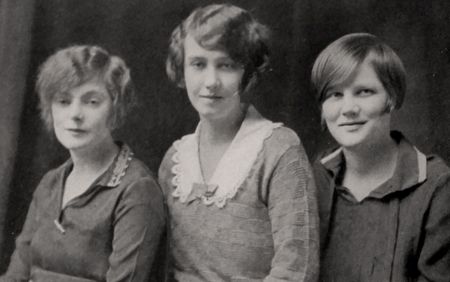 Lenore Nesler, Lucille Scott, Lillian Mae Johnson |
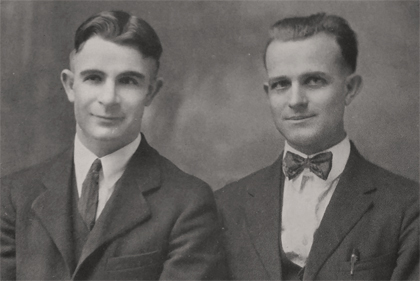 Affirmative Team: B.D. Baldwin and Homer W. Ford |
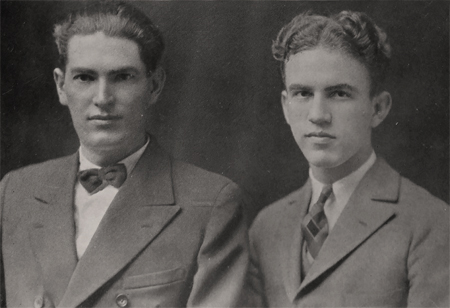 Negative Team: J.C. Cave and Roy H. Owsley |
Campus oratory
Ogden: O.M. Shultz; Robinson: Mary Jo Hendricks
1928 marked the merging of Ogden College into Western Kentucky State Normal School & Teachers College, and as can be seen by the name above, this brought women (sixteen years old, in Mary Jo's case) into competing for the Robinson Oratorical Medal. A June 1928 College Heights Herald article lists four women among the six Robinson contestants.27 The winner was actually a student of the Training School, which was a high school. Mary Jo continued to compete in oratory for the Training School the next year as well. That next year, 1929, included only men in the Ogden and Robinson competitions. Whether that was by design or circumstance is unknown. No records of a woman competitive orator at Western arise in these archives again until 1938.
Congress Debating Club
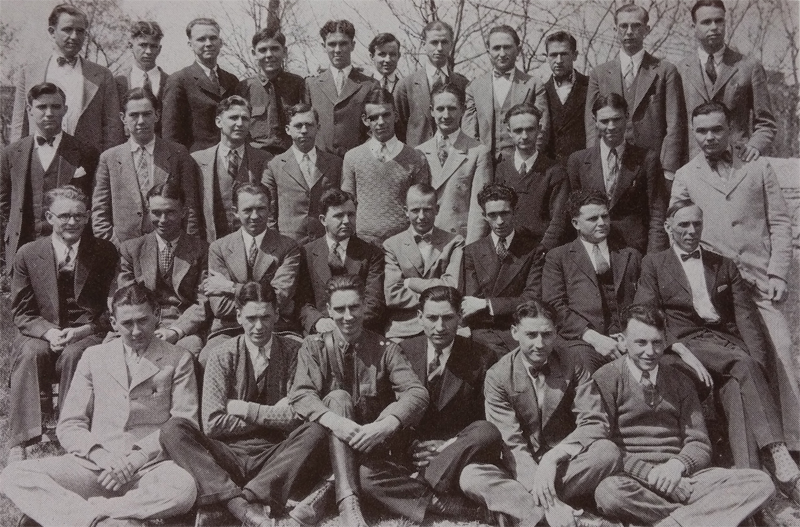 Dr. Finley C. Grise (sponsor), J.C. Cave (pres), Roy H. Owsley (sec), D.F. Nisbet
(sgt-at-arms) R. Arnold, Charles Blake, Raymond Brown, R.P. Brown, Gilbert Burkhead,
Clifton Cook, Albert Gordon Crume, Guy Foreman, Earl E. Garrison, E.F. Glenn, Marvin
S. Greer, Edwin Hadden, William Eberley Hammack, Jessie L. Hart, Orbra E. King, Ray
Ladd, Buell A. Lawrence, Raymond Long, Arlice Meador, Charles Harrison Redmon, Shelby
Riggs, T.W. Rogers, H.F. Sanders, T.C. Simmons, H.K. Spear, Homer Sumner, Delbert
Waggoner, R.A. Walters, Roy H. Whalin, W.R. Winfrey, Durward B. Williams
Dr. Finley C. Grise (sponsor), J.C. Cave (pres), Roy H. Owsley (sec), D.F. Nisbet
(sgt-at-arms) R. Arnold, Charles Blake, Raymond Brown, R.P. Brown, Gilbert Burkhead,
Clifton Cook, Albert Gordon Crume, Guy Foreman, Earl E. Garrison, E.F. Glenn, Marvin
S. Greer, Edwin Hadden, William Eberley Hammack, Jessie L. Hart, Orbra E. King, Ray
Ladd, Buell A. Lawrence, Raymond Long, Arlice Meador, Charles Harrison Redmon, Shelby
Riggs, T.W. Rogers, H.F. Sanders, T.C. Simmons, H.K. Spear, Homer Sumner, Delbert
Waggoner, R.A. Walters, Roy H. Whalin, W.R. Winfrey, Durward B. Williams
1928-29
Western Debaters
|
On 23 March, the Law School at the University of Louisville exchanged male debaters with Western, with each school’s affirmative team debating at home. The negative team of Thompson, Roberts, and Dowell lost, but the affirmative team of Hayes and Smith is believed to have won.28 The lack of clarity comes from the headline claiming the two schools divided decisions, but the article itself for the affirmative team makes no claim to who won. Thompson and Roberts also hosted a debate with Asbury College on 9 April, but lost that as well.(Ibid) |
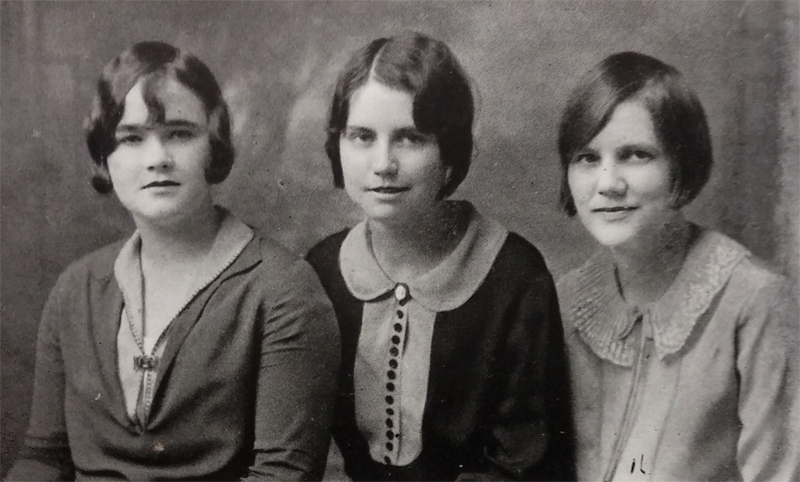 Hazel Adams, Irma Lawrence, Lillian Mae Johnson
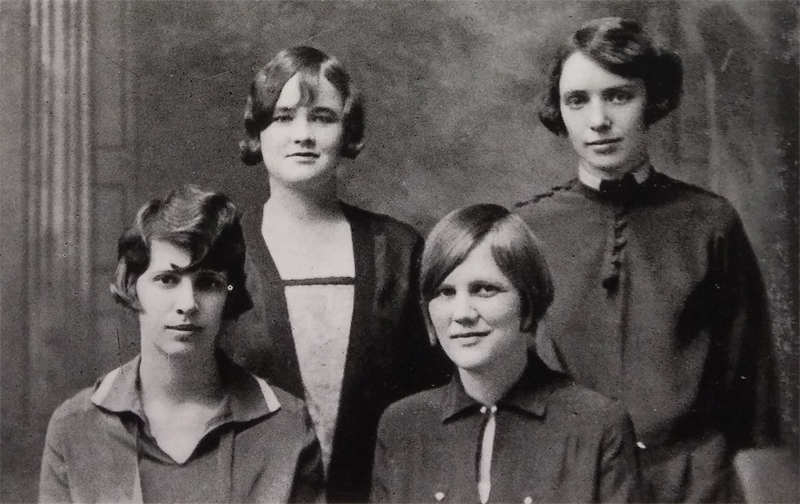 (back) Hazel G. Adams, Mary D. Gardner; (front) Clarice Hines, Lillian Mae Johnson At some point in February 1929, Johnson, Lawrence, and Adams (neg) of the Teacher's College lost to Ohio Wesleyan in VanMeter Hall.29 They planned to debate the University of Louisville in March, but no record of such a debate has yet been found. |
Campus Oratory
Ogden: Franklin Pierce Hayes; Robinson: E. Kelly Thompson 30
Congress Debating Club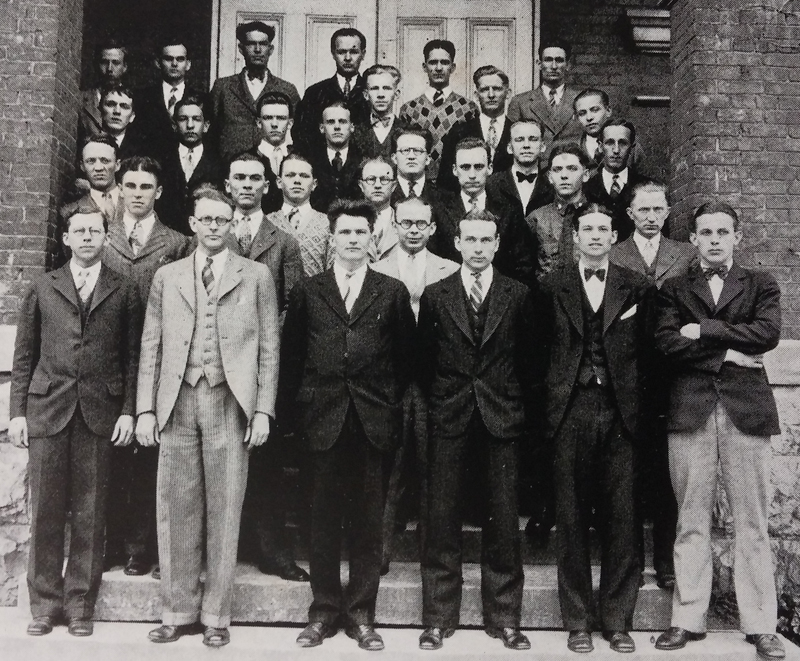 O.L. Adams, L.H. Arnold, B.E. Ausenbaugh, Ivy L. Baker, Wendell Bunch, B.K. Dowell, Guy Forman, Nuby Greer, James Hall, H.R. Hammond, Roy B. Hawk, Clarion Hayden, T.W. Hines, Ralph Honaker, J.M. Lynch, James L. Martin, Charles Nevill, Rogil Peyton, Charles Harrison Redmon, W.J. Rogers, H.H. Schlinker, William R. Smith, W.A. Stith, J.F. Stovall, Kelly Thompson, Leamon Turner, Ralph Whalin, Mervin R. Whipple, Percival Wilcox, W.R. Winfrey |
Girls Debating Club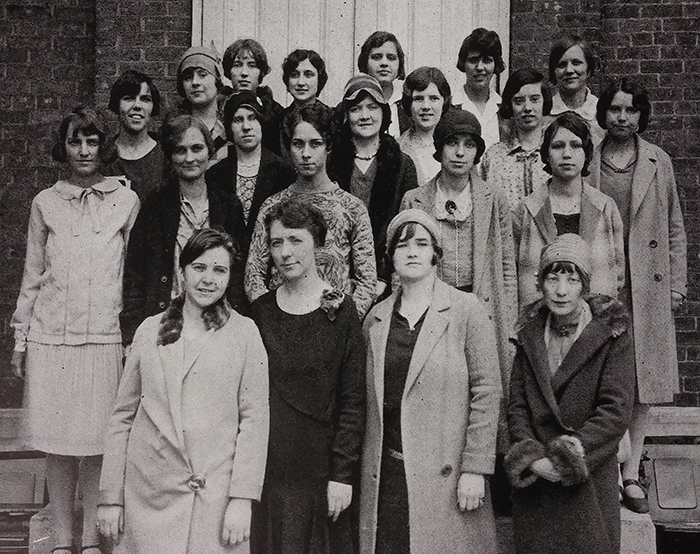 Ms. Hallie Gaines (sponsor; 2nd from left, front) Hazel G. Adams, Maralee Arnett, Rose Velta Biggerstaff, Helen Brink, Mary Eva Dawson, Elizabeth Dollar, Amma Fisher, Mary D. Gardner, Virginia Hall, May Hawkins, Mary Holloway, Clarice Hines, Lillian Mae Johnson, Irma Lawrence, Charline Littlejohn, Christine Milliken, Hazel Turbeville, Lee Smith |
- Catalog Number UA12.2.38, Box 1. "UA12 Student Affairs Series. 2 Student Activities, Organizations & Leadership Office 38. Congress Debating Club," WKU Archives, accessed 29 November 2014, URL: http://wku.pastperfect-online.com/35749cgi/mweb.exe?request=record;id=7201DDAC-1785-454A-A741-329815568040;type=301; Berryman, W. K. & C. S. Lowry. "Congressional Record I." Congress Debating Club Minutes, Nov. 1919 - July 1924. Library Special Collections, Western Kentucky University.
- T.J. Coates to Henry Hardin Cherry. Correspondence. 12 February 1920. UA3.1.2.1, Box 3, Folder 62. Library Special Collections, Western Kentucky University; Henry Hardin Cherry to T.J. Coates. Correspondence. 5 March 1920. UA3.1.2.1, Box 3, Folder 62. Library Special Collections, Western Kentucky University. Whether Cherry was referring to the 1910 contest remains unclear, but a case can be made. A news article following the 1910 contest describes Western Normal as one of three Normal schools "now composing the Inter-State Oratorical Association." "Oratory: Heard From Female Lips At Vanmeter Hall." OS Box 52, Folder 2, Cut Scrapbook 1909-1911, no date, no publication. Library Special Collections, Western Kentucky University.. The IOA, of course, already existed, and was not a creature of either of the three schools in the 1910 contest. Whether the article intended to infer the schools comprised a new Normal school league or instead a regional qualifier for the final IOA contest is yet unknown. If it was the former, this may be the seemingly short-lived organization that Cherry refers to in the 1920 letter.
- Western Kentucky University, "UA12/2/1 Normal Heights, Vol. 6, No. 1" (1922). WKU Archives Records. Paper 4072. http://digitalcommons.wku.edu/dlsc_ua_records/4072
- Woolbert, Charles H. and Severina E. Nelson. "The Art of Interpretative Speech, Fourth Ed." New York, Appleton-Century-Crofts: 1956, pp 5-8.
- Cornette, James P. "A History of the Western Kentucky State Teachers College." Teachers College Heights, vol X1X, no 1. Doctoral Dissertation. pp 154, 161, 164.
- "Normal School Victorious in Annual Debate." The Park City Daily News. 2 May 1921. Page 1. Library Special Collections, Western Kentucky University. The article adds that some of UK's most successful debaters of the previous two years had been Normal School alums; When the November 1921 Normal Heights declared what the school had won a debate "last year," this author believes this to mean the previous school year: Western Kentucky University, "UA12/2/1 Normal Heights, Vol. 5, No. 4" (1921). WKU Archives Records. Paper 4064. http://digitalcommons.wku.edu/dlsc_ua_records/4064; Reference to a planned debate with the "State college" during a banquet, which is presumed to be either the Normal School's commencement or a club banquet; Congress Debating Club Minutes book 1.
- "Ogden Debating Team Victorious." The Park City Daily News. 16 April 1921. Page 1. Library Special Collections, Western Kentucky University.
- Ogden College, "UA97/7 The Cardinal, Vol. 1, No. 9" (1922). WKU Archives Records. Paper 3974. http://digitalcommons.wku.edu/dlsc_ua_records/3974
- The source is a photo and a caption, with no associated article. The caption claims the three students will debate next Monday on 1 April, but it was printed in an 11 April issue. Additionally, 1 April was a Sunday. The Park City Daily News. 11 May 1923. Page 6. Library Special Collections, Western Kentucky University.
- "College Debate." Ogden College, "UA97/7 The Cardinal, Vol. II, No. 9" (1923). WKU Archives Records. Paper 3985. http://digitalcommons.wku.edu/dlsc_ua_records/3985
- As an additional note, the local daily newspaper took to calling sports and debate teams from the Teachers College "The Pedagogues;" "Teachers Debate Berea Collegians." The Park City Daily News. 24 April 1924. Page 1. Library Special Collections, Western Kentucky University; "Teacher Debaters Defeat Berea Team." The Park City Daily News. 29 April 1924. Page 7. Library Special Collections, Western Kentucky University.
- Ogden College, "Debating Team: is Beaten by Morton-Elliott in Heated Contest." UA97/7 The Cardinal, Vol. 3, No. 12 (1924). WKU Archives Records. Paper 4005. http://digitalcommons.wku.edu/dlsc_ua_records/4005; "Red and Green: Standard Bearers Chosen after Tryout Wednesday Morning, February 27." Ogden College, "UA97/7 The Cardinal, Vol. 3, No. 8" (1924). WKU Archives Records. Paper 3999. http://digitalcommons.wku.edu/dlsc_ua_records/3999
- "Colored Bretheren: Stages a Very Enlightening Debate on a Live Subject." Ogden College, "UA97/7 The Cardinal, Vol. 3, No. 7" (1924). WKU Archives Records. Paper 4000. http://digitalcommons.wku.edu/dlsc_ua_records/4000
- WKU Student Affairs, "UA12/2/1 College Heights Herald, Vol. I, No. 9" (1925). WKU Archives Records. paper 2226. http://digitalcommons.wku.edu/dlsc_ua_records/2226
- This is not suspected to be the Interstate Oratorical Association contest, as a source two years later specifies that it is provided by the Better American Federation of California, and that the subject area is always on American political leaders.
- "School Notes." Ogden College, "UA97/7 The Cardinal, Vol. IV, No. 15" (1925). WKU Archives Records. Paper 4028. http://digitalcommons.wku.edu/dlsc_ua_records/4028
- "Debating Program for 1926," Teachers College Heights, vol 9, no 1, December 1926 (Bowling Green, KY: Western KY St. Normal School and Teacher's College); "Four Debates to be Held This Spring," Teachers College Heights, vol 9, no 2, February 1926 (Bowling Green, KY: Western KY St. Normal School and Teacher's College), 4. Library Special Collections, Western Kentucky University.
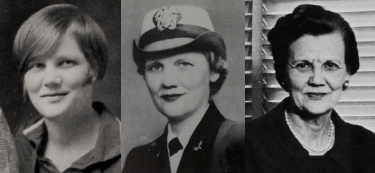 Lillian Mae Johnson serves as an interesting case study for some women of the period.
Born in Elkton, KY, she was nicknamed "Jack" by her classmates and achieved the following
in her time at Western: v-p Senior Class '29; WaKaTaCa Club; pres. English Club '28;
Pres. Girls' Debating Club '28-'29; v-p Soph. Class '26; sec Jr. Class '27; capt Basketball
Team '27; letter Basketball '26, '27, '28, '29; Head Cheer Leader '26-'27; Adv Mgr
Herald '27; Assoc Editor Talisman '29; Debating Team '26, '28, '29. She taught Psychology
at Western for years, then completed a Masters and Doctorate in Psychology at University
of Chicago, before returning to Western. She then joined the Navy in 1942 and finished
as a Captain during the Second World War, then taught Psychology at University of
Cincinnati, finished there as Dean of Students before moving in with her sister back
in Todd County before dying in 1989 at age 80 (or 82). She never married.
Lillian Mae Johnson serves as an interesting case study for some women of the period.
Born in Elkton, KY, she was nicknamed "Jack" by her classmates and achieved the following
in her time at Western: v-p Senior Class '29; WaKaTaCa Club; pres. English Club '28;
Pres. Girls' Debating Club '28-'29; v-p Soph. Class '26; sec Jr. Class '27; capt Basketball
Team '27; letter Basketball '26, '27, '28, '29; Head Cheer Leader '26-'27; Adv Mgr
Herald '27; Assoc Editor Talisman '29; Debating Team '26, '28, '29. She taught Psychology
at Western for years, then completed a Masters and Doctorate in Psychology at University
of Chicago, before returning to Western. She then joined the Navy in 1942 and finished
as a Captain during the Second World War, then taught Psychology at University of
Cincinnati, finished there as Dean of Students before moving in with her sister back
in Todd County before dying in 1989 at age 80 (or 82). She never married.
- "Berea Will Meet Western in Pair of Vocal Fights." The Park City Daily News 6 April 1927, page 1. Library Special Collections, Western Kentucky University.
- WKU Student Affairs, "UA12/2/1 College Heights Herald, Vol. III, No. 6" (1927). WKU Archives Records. Paper 2249. http://digitalcommons.wku.edu/dlsc_ua_records/2249
- The article claims it was Western's first foray into intercollegiate oratorical competition, which only suggests the author was unaware of the 1910 contest; WKU Student Affairs, "UA12/2/1 College Heights Herald, Vol. III, No. 7" (1927). WKU Archives Records. Paper 2250. http://digitalcommons.wku.edu/dlsc_ua_records/2250
- Ogden College, "UA97/7 The Cardinal, Vol. VI, No. 2" (1926). WKU Archives Records. Paper 4020. http://digitalcommons.wku.edu/dlsc_ua_records/4020; "Heard Around the Campus."Ogden College, "UA97/7 The Cardinal, Vol. VI, No. 4" (1927). WKU Archives Records. Paper 4018. http://digitalcommons.wku.edu/dlsc_ua_records/4018
- Claimed on her 1931 graduating accolades: none, "UA12/2/2 1931 Talisman" (1931) page 31. WKU Archives Records. Paper 345. http://digitalcommons.wku.edu/dlsc_ua_records/345
- WKU Student Affairs, "UA12/2/1 College Heights Herald, Vol. IV, No. 5" (1928). WKU Archives Records. Paper 2256. http://digitalcommons.wku.edu/dlsc_ua_records/2256
- "Annual Intercollegiate Debates to be Held This Year," Teachers College Heights, vol 10, no 3, February 1928 (Bowling Green, KY: Western KY St. Normal School and Teacher's College), 4. Library Special Collections, Western Kentucky University.
- WKU Student Affairs, "UA12/2/1 College Heights Herald, Vol. IV, No. 4" (1928). WKU Archives Records. Paper 2255. http://digitalcommons.wku.edu/dlsc_ua_records/2255
- WKU Student Affairs, "UA12/2/1 College Heights Herald, Vol. IV, No. 9" (1928). WKU Archives Records. Paper 2259. http://digitalcommons.wku.edu/dlsc_ua_records/2259
- A minor side note: the negative team and faculty member N.O. Taff were in a car accident on the way to Louisville; WKU Student Affairs, "UA12/2/1 College Heights Herald, Vol. 7, No. 7" (1929). WKU Archives Records. paper 2267. http://digitalcommons.wku.edu/dlsc_ua_records/2267; "Western Debate Teams to Argue with Cardinals." The Park City Daily News 21 March 1929, page 1. Library Special Collections, Western Kentucky University.
- "Debating Club is Defeated by Ohio Wesleyan." WKU Student Affairs, "UA12/2/1 College Heights Herald, Vol. V, No. 5" (1929). WKU Archives Records. Paper 2265. http://digitalcommons.wku.edu/dlsc_ua_records/2265
- E. Kelly Thompson, a competitive debater and winner of the Robinson Declamation later became a sports writer for the Louisville Courier Journal. He returned to Western as a public relations staffer, and after decades of service he became President of the college in 1955. Presiding until 1969, he oversaw the transition of Western into a university. Rumor had it that he was the first sports writer ever to become a university president.
< Back to Historical Archives main page
Some of the links on this page may require additional software to view.


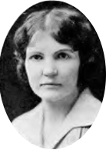 The women to the right debated Maryville College (TN) and Ohio Wesleyan. One debate
was lost and the other won. 1928 also marks the formal creation, by Ms. Frances Richards (top left), of the Girl's Debating Club, which lasted three years. No 1928 club photo
has yet been found, and the only known member was Maralea Arnett.
The women to the right debated Maryville College (TN) and Ohio Wesleyan. One debate
was lost and the other won. 1928 also marks the formal creation, by Ms. Frances Richards (top left), of the Girl's Debating Club, which lasted three years. No 1928 club photo
has yet been found, and the only known member was Maralea Arnett.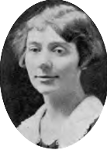 competitive team pictured here.
competitive team pictured here.